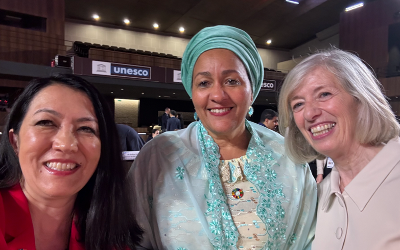Igniting change with CARE-KNOW-DO: The Open University's €238K EU grant to pioneer Researchers' Professional Development for SDGs

The Open University (OU) has secured €238K in funding from the European Union. The METEOR project aims to develop and validate a model for the professional training of postgraduates and early career researchers, based on the CARE-KNOW-DO framework contributing to the Sustainable Development Goals (UN SDGs). This initiative is designed to benefit the research ecosystem aligned with the principles of Open Science and Responsible Research and Innovation (RRI), integrating scientific advances with social innovation and sustainability priorities.
While the traditional PhD process emphasizes individual academic achievement within a competitive research field, METEOR fosters transversal skills, empowering early career researchers to collaborate through peer mentoring groups by ‘caring’ about transformative research, developing transdisciplinary ‘knowledge,’ and taking responsible research into ‘action’ for innovation at national and cross-national levels.
The CARE-KNOW-DO model, developed by Dr Alexandra Okada, project lead, integrates ethical considerations, knowledge acquisition, and action-oriented problem-solving. It has been implemented through a series of EU-funded projects that she led, including weSPOT, ENGAGE, and CONNECT, totalling more than €10M of funding. These projects engaged a large network of schools, universities, enterprises, civil society, and policymakers to discuss issues and solutions toward the Sustainable Development Goals using engaging participatory approaches and emerging technologies. In METEOR (€2.9M), the model will be further expanded to enhance researchers' transversal skills involving twelve partners in these countries: Austria, Brazil, Cyprus, Denmark, Finland, Georgia, Italy, Norway, Poland, Spain, Türkiye and the United Kingdom.
Dr Okada and her team will be responsible for the implementation of METEOR in the UK contributing to five objectives:
- Gather and analyse data to support the need for an innovative doctoral training program.
- Develop and deliver online training resources using participatory methods with input from PhDs, Early Career Researchers
- Establish peer mentoring groups of researchers collaborating for proposals on the UN SDGs.
- Create policies and strategies to expand doctoral training locally and nationally.
- Share activities and results with a broader audience and ensure the project's continuation.
METEOR activities will benefit:
- Doctoral candidates: Improved job prospects and earnings.
- Institutions: Better recruitment, supervision, and more impactful research.
- Industry/Public sector: Employees with high-level research and transversal skills.
- Society: More research focused on addressing societal challenges.

Dr Okada recently attended the UN SDG Summit in New York and the Global Education Leadership Conference at UNESCO Paris. She stated, “The CARE-KNOW-DO model focuses on sustainability issues and emphasizes actionable knowledge that is important for communities. Many students, teachers, families, STEM professionals, and policymakers have used it, with promotion by schools and universities. We have seen great results in enhancing learning outcomes and supporting the Agenda 2030 goals set in 2015.
Receiving this grant will enable The Open University to expand this model. We'll innovate professional development for researchers in Education working with all fields through cross-disciplinary and cross-national peer mentoring groups. We know time is running out. We're now at the midpoint with only six years left for the SDGs. This is a crucial time for acceleration. Education and research play a key role. The cost of inaction is too high. Nations need to invest quickly in educators and researchers. We need effective, scalable, and impactful professional development models. This is where METEOR comes in."
Contact our news team
For all out of hours enquiries, please telephone +44 (0)7901 515891
Contact detailsNews & articles

OU researchers lead international advances in planetary protection
Open University researchers are leading international advances in planetary protection, helping ensure that space exploration is safe, sustainable, and scientifically rigorous.